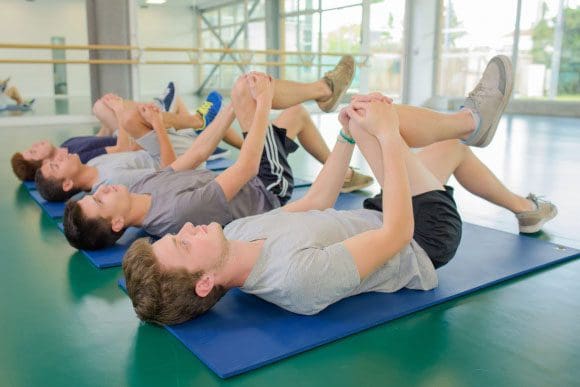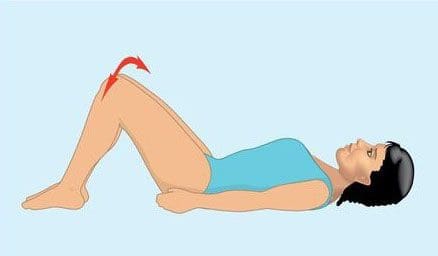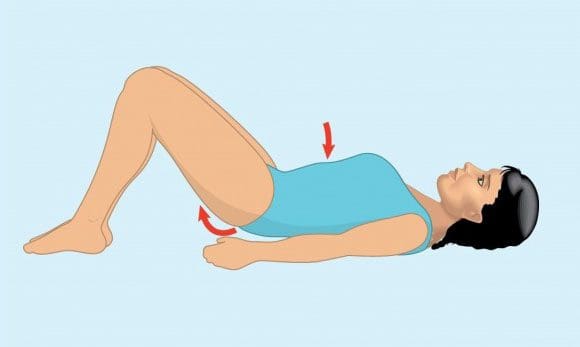Table of Contents
What exercise/stretches help reduce sciatic nerve pain?
Here are four exercises/stretches that your chiropractor/physical therapist may recommend to help you reduce sciatic nerve pain:
- Pelvic tilt
- Knee to chest
- Lower trunk rotations
- Arm and leg extensions

Pelvic Tilt
Its purpose is to strengthen the lower abdominal muscles and stretch the lower back.
How to do it:
- Lie on back
- Exhale and tighten abdominal muscles while pushing the belly button toward the floor and flatten the lower back
- Hold the position for 5 seconds.
- Repeat ten times, holding the position for 5 seconds each
Am I doing it right?
- Place the pinky finger on the hip bone and the thumb on the lowest rib (same side).
- When tightening the abdominal muscles, the amount of space between the pinky finger and thumb should get smaller.
- Pelvic tilts help strengthen the lower abdominal muscles and stretch the low back.
Knee to Chest
Its purpose is to help reduce nerve compression in the low back, which can help alleviate lower back pain.
- Lie on back
- Start with either left or right knee and use your hands to pull the bent knee toward the chest gently.
- Hold for 10 seconds
- Repeat movement on the opposite knee
- Perform 3 to 5 times, holding the position for 10 seconds each
- Use your hands to pull both knees toward the chest gently
- Hold for 10 seconds
- Repeat movement with both knees 3 to 5 times, holding the position for 10 seconds each

Knee-to-chest exercises/stretches can help reduce nerve compression on the lumbar spine alleviating lower back pain.
Lower Trunk Rotation
Its purpose is to increase the spine’s mobility and flexibility.
- Lie on your back with both knees bent upright and feet flat on the floor (aka the hook lying position).
- Hold both knees together, rotate knees to one side
- Hold for 3 to 5 seconds
There will be a gentle stretching sensation on the opposite side of the lower back and hip area.
- Contract abdominal muscles and rotate both knees to the opposite side
- Hold for 3 to 5 seconds
- Repeat 10 times on each side

Lower body rotations can help you strengthen your lower abdominal muscles and stretch your low back.
All Fours Opposite Arm and Leg Extensions
Its purpose is to strengthen the abdominal muscles and low back and stabilize the areas.
- Get in a crawling position on all fours.
- Contract abdominal muscles to keep back flat and straight
- Raise one leg upward behind you and straighten outward
- Hold for 3 to 5 seconds
- Repeat the movement on the opposite side
Once this exercise/stretch can be performed ten times with functional pain, add arm movement with each leg extension:
- Extend the arm (opposite side of the leg) upward and outward in front of the body
- Hold for 3 to 5 seconds
- Repeat on the opposite side
Perform ten times

How do these exercises/stretches reduce sciatic pain
Abdominal and spinal muscles are essential components of the spine’s system.
These exercises/stretches can help:
- Strengthen the spine
- Increase flexibility
- Increase range of motion
These exercises can help keep the spine’s structural components strong and healthy, reducing pain and speeding up healing.
Regular exercise causes the body to release endorphins or hormones that interact with the pain receptors in the brain that, reduce the perception of pain.
Will exercising with sciatica cause/exacerbate the injury
Do not perform these exercises without consulting your doctor, spine specialist, or chiropractor.
Whatever fitness level, remember that even trained professional athletes exercise with a doctor, physical therapist, or other healthcare expert’s approval and clearance.
Obtaining an accurate diagnosis of the exact cause of the sciatic pain
It is essential before considering any exercise program
Be gentle with your spine, and don’t push too hard while exercising. This is to avoid exacerbating sciatic pain or creating a new injury.
If exercise increases pain or causes nerve-related symptoms like:
- Weakness
- Tingling sensation
- Numbness
Stop and contact your doctor or chiropractor immediately!
El Paso, TX Sciatica Pain Chiropractic Therapy
Sandra Rubio discusses how Dr. Alex Jimenez and his staff can help relieve your sciatica symptoms. Dr. Jimenez is the homeopathic, non-surgical choice for sciatic nerve pain and its associated symptoms. Chiropractic care can improve pain and discomfort and reduce irritation and inflammation caused by sciatica. In addition, a chiropractor like Dr. Jimenez can also provide nutritional and fitness advice for sciatic nerve pain. Other treatment methods, like deep-tissue massage, can help relieve sciatica symptoms.
Sciatica is generally caused by the compression of lumbar or sacral nerves or by the reduction of the sciatic nerve. When a dorsal nerve root compression causes sciatica, it’s called lumbar radiculopathy. This can occur because of a spinal disk bulge or spinal disk herniation (a herniated intervertebral disc), by roughening, enlarging, or misalignment (spondylolisthesis) of the fascia, or as a consequence of degenerated discs which can reduce the diameter of the lateral foramen by which nerve roots exit the spine.
NCBI Resources
Sciatica is a shooting pain that originates in the lower back and travels through the hip, buttock, and back of the leg. The pain can be so severe that it inhibits mobility and prevents people from working, taking care of their homes, or enjoying life. Doctors have treated the condition with medications and some invasive therapies, but chiropractic treatments are extremely effective in alleviating the pain and curing the disease.
Post Disclaimer
Professional Scope of Practice *
The information on this blog site is not intended to replace a one-on-one relationship with a qualified healthcare professional or licensed physician and is not medical advice. We encourage you to make healthcare decisions based on your research and partnership with a qualified healthcare professional.
Blog Information & Scope Discussions
Welcome to El Paso's Premier Wellness and Injury Care Clinic & Wellness Blog, where Dr. Alex Jimenez, DC, FNP-C, a board-certified Family Practice Nurse Practitioner (FNP-BC) and Chiropractor (DC), presents insights on how our team is dedicated to holistic healing and personalized care. Our practice aligns with evidence-based treatment protocols inspired by integrative medicine principles, similar to those found on this site and our family practice-based chiromed.com site, focusing on restoring health naturally for patients of all ages.
Our areas of chiropractic practice include Wellness & Nutrition, Chronic Pain, Personal Injury, Auto Accident Care, Work Injuries, Back Injury, Low Back Pain, Neck Pain, Migraine Headaches, Sports Injuries, Severe Sciatica, Scoliosis, Complex Herniated Discs, Fibromyalgia, Chronic Pain, Complex Injuries, Stress Management, Functional Medicine Treatments, and in-scope care protocols.
Our information scope is limited to chiropractic, musculoskeletal, physical medicine, wellness, contributing etiological viscerosomatic disturbances within clinical presentations, associated somato-visceral reflex clinical dynamics, subluxation complexes, sensitive health issues, and functional medicine articles, topics, and discussions.
We provide and present clinical collaboration with specialists from various disciplines. Each specialist is governed by their professional scope of practice and their jurisdiction of licensure. We use functional health & wellness protocols to treat and support care for the injuries or disorders of the musculoskeletal system.
Our videos, posts, topics, subjects, and insights cover clinical matters and issues that relate to and directly or indirectly support our clinical scope of practice.*
Our office has made a reasonable effort to provide supportive citations and has identified relevant research studies that support our posts. We provide copies of supporting research studies available to regulatory boards and the public upon request.
We understand that we cover matters that require an additional explanation of how they may assist in a particular care plan or treatment protocol; therefore, to discuss the subject matter above further, please feel free to ask Dr. Alex Jimenez, DC, APRN, FNP-BC, or contact us at 915-850-0900.
We are here to help you and your family.
Blessings
Dr. Alex Jimenez DC, MSACP, APRN, FNP-BC*, CCST, IFMCP, CFMP, ATN
email: coach@elpasofunctionalmedicine.com
Licensed as a Doctor of Chiropractic (DC) in Texas & New Mexico*
Texas DC License # TX5807
New Mexico DC License # NM-DC2182
Licensed as a Registered Nurse (RN*) in Texas & Multistate
Texas RN License # 1191402
ANCC FNP-BC: Board Certified Nurse Practitioner*
Compact Status: Multi-State License: Authorized to Practice in 40 States*
Graduate with Honors: ICHS: MSN-FNP (Family Nurse Practitioner Program)
Degree Granted. Master's in Family Practice MSN Diploma (Cum Laude)
Dr. Alex Jimenez, DC, APRN, FNP-BC*, CFMP, IFMCP, ATN, CCST
My Digital Business Card



